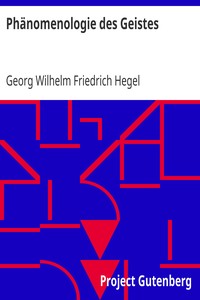Phänomenologie des Geistes by Georg Wilhelm Friedrich Hegel
"Phänomenologie des Geistes" by Georg Wilhelm Friedrich Hegel is a philosophical treatise written in the early 19th century. This seminal work explores the development of consciousness and knowledge through a dialectical process, detailing how human awareness progresses through various stages toward an understanding of absolute knowledge or the Absolute Spirit. Hegel seeks to replace psychological explanations with a systematic philosophical approach that encapsulates the evolutions of consciousness across its diverse manifestations. At
the start of the text, Hegel introduces the overarching theme of the book, which is the evolution of consciousness—a process he refers to as "werdende Wissen" (becoming knowledge). He aims to construct a scientific account of consciousness, abolishing the limitations of prior philosophical views. The opening establishes Hegel's intent to transform the chaotic richness of spiritual phenomena into a structured philosophical narrative, encompassing key aspects like self-awareness, morality, and religion. Hegel outlines various stages of consciousness, beginning with sensory certainty, through perception, understanding, and ultimately leading to the realization of pure thought and absolute knowledge. This initial framework sets the stage for a comprehensive exploration of the spirit's journey toward self-realization and truth, which unfolds in the subsequent chapters. (This is an automatically generated summary.)
Read or download for free
| How to read | Url | Size | |||
|---|---|---|---|---|---|
| Read now! | https://www.gutenberg.org/ebooks/6698.html.images | 1.2 MB | |||
| EPUB3 (E-readers incl. Send-to-Kindle) | https://www.gutenberg.org/ebooks/6698.epub3.images | 471 kB | |||
| EPUB (older E-readers) | https://www.gutenberg.org/ebooks/6698.epub.images | 488 kB | |||
| EPUB (no images, older E-readers) | https://www.gutenberg.org/ebooks/6698.epub.noimages | 474 kB | |||
| Kindle | https://www.gutenberg.org/ebooks/6698.kf8.images | 903 kB | |||
| older Kindles | https://www.gutenberg.org/ebooks/6698.kindle.images | 791 kB | |||
| Plain Text UTF-8 | https://www.gutenberg.org/ebooks/6698.txt.utf-8 | 1.2 MB | |||
| Download HTML (zip) | https://www.gutenberg.org/cache/epub/6698/pg6698-h.zip | 466 kB | |||
| There may be more files related to this item. | |||||
Similar Books
About this eBook
| Author | Hegel, Georg Wilhelm Friedrich, 1770-1831 |
|---|---|
| Title | Phänomenologie des Geistes |
| Note | Reading ease score: 44.4 (College-level). Difficult to read. |
| Note | Wikipedia page about this book: https://en.wikipedia.org/wiki/The_Phenomenology_of_Spirit https://de.wikipedia.org/wiki/Ph%C3%A4nomenologie_des_Geistes |
| Credits | Produced by Delphine Lettau and Gutenberg Projekt-DE |
| Language | German |
| LoC Class | B: Philosophy, Psychology, Religion |
| Subject | Consciousness |
| Subject | Truth |
| Subject | Spirit |
| Subject | Philosophy, German |
| Category | Text |
| EBook-No. | 6698 |
| Release Date | Oct 1, 2004 |
| Most Recently Updated | Nov 8, 2012 |
| Copyright Status | Public domain in the USA. |
| Downloads | 588 downloads in the last 30 days. |
| Project Gutenberg eBooks are always free! | |

